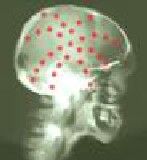- Recognizing the Signs of Hypothyroidism
- 10 Strategies to Overcome Insomnia
- Could Artificial Sweeteners Be Aging the Brain Faster?
- Techniques for Soothing Your Nervous System
- Does the Water in Your House Smell Funny? Here’s Why
- Can a Daily Dose of Apple Cider Vinegar Actually Aid Weight Loss?
- 6 Health Beverages That Can Actually Spike Your Blood Sugar
- Treatment Options for Social Anxiety Disorder
- Understanding the Connection Between Anxiety and Depression
- How Daily Prunes Can Influence Cholesterol and Inflammation
Epilepsy Often Hand-in-Hand With Other Health Problems: CDC


THURSDAY, Oct. 31Many people with epilepsy also suffer from other serious medical problems, such as heart disease and cancer, at rates higher than the general population, U.S. health officials said Thursday.
Worse still, these co-occurring conditions often go ignored or undertreated by doctors and patients, according to the U.S. Centers for Disease Control and Prevention.
“People with epilepsy are not only living with their epilepsy, but many are also living with cardiovascular, respiratory, inflammatory and other disorders,” said report co-author Rosemarie Kobau, a CDC public health analyst.
This new study, based on responses to the 2010 National Health Interview Survey, is published Nov. 1 in the CDC’s Morbidity and Mortality Weekly Report.
About 2.3 million U.S. adults have epilepsy, a seizure disorder that varies in cause and severity. Controlling seizures is most important, Kobau said, but preventing and/or treating these additional health problems is also essential because they can shorten lifespan and increase health costs.
She said the challenges of controlling epilepsy result in some of these other problems falling by the wayside. “Treating epilepsy can be so intense, oftentimes some of these secondary conditions might get neglected,” Kobau said.
This is a problem for many patients living with a chronic disease, she added. “If one is undergoing chemotherapy for cancer, it’s likely some arthritis symptoms might get neglected,” Kobau explained.
Among survey respondents, about 20 percent of adults with epilepsy reported having a history of heart disease compared with about 11 percent of the general population. Up to 18 percent of people with epilepsy reported having a stroke, compared with 2 percent of the general population, and almost half of those with epilepsy said they’d had an asthma attack in the past year compared with about one-third of adults without epilepsy.
Cancer was more common in adults with epilepsy than without (about 11 percent versus 8 percent). High blood pressure and diabetes were also more common in adults with epilepsy than in those without the seizure disorder, according to the report.
Ulcers, arthritis and other types of pain were also reported much more frequently among respondents with epilepsy, the investigators found.
The report is a wake-up call for the epilepsy community, said Janice Buelow, vice president of programs and research at the Epilepsy Foundation.
“We know that people with epilepsy tended to smoke more, tended to be overweight, so this isn’t brand new news to us,” she said. However, “we tend to forget that people with epilepsy have a chronic disorder . . . Sometimes what we want to do is just count seizures,” Buelow said.
There are many reasons why someone with epilepsy might suffer from additional health problems, Kobau said. For example, stroke, migraines and headaches are related to the risk for epilepsy, she noted.
Also, some of the medications used to control seizures cause weight gain and higher cholesterol levels, which combine to raise the risk for heart disease and other conditions, Kobau pointed out.
In addition, epilepsy carries a stigma that might put many patients at a social disadvantage, she suggested. “Many people with epilepsy live at lower socioeconomic levels and have higher rates of unemployment,” Kobau said.
Doctors play an important role in addressing these co-occurring conditions, she stated. “They need to recognize how common these problems are in people with epilepsy and do better screening, diagnosis and treatment,” Kobau concluded. And patients also have a role in controlling and preventing other chronic conditions, she suggested.
“People with epilepsy should adopt a healthy lifestyle; if they smoke, they should quit smoking; they should talk to their doctor about safe physical activity options; they should eat a healthy diet and try to maintain a healthy weight; get a good night’s sleep, and try to reduce their stress,” Kobau said.
Dr. Cynthia Harden, director of the Comprehensive Epilepsy Care Center at North Shore-LIJ in Manhasset, N.Y., thinks many co-occurring conditions are caused by older drugs used to control seizures.
“I don’t think you can explain this by lifestyle,” she said. “We are using newer anti-seizure drugs, so the drug effect should be becoming less.”
Harden recommends that doctors rely less on the older epilepsy drugs and “focus on using the newer ones that don’t have so many adverse effects.”
These newer drugs include Neurontin, Lamictal, Topamax, Zonegran, Keppra, Trileptal, and Gabitril, many of which are now generic.
More information
For more information on epilepsy, visit the Epilepsy Foundation.
Source: HealthDay
Copyright © 2026 HealthDay. All rights reserved.










